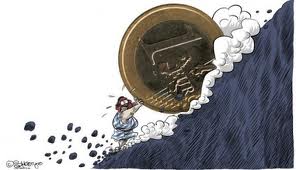Greece is finally showing signs of recovering from its 2008 crash. However, as much as macroeconomic reforms are needed, the future of the Greek economy will be determined by its competitiveness, which concerns costs, but is also measured by innovation.
In that regard, Greece finds itself at a crossroads. It can improve its competitiveness by reducing costs in its traditional sectors, such as tourism, agriculture, and trade. Or it can aim higher – by laying the groundwork for higher value-added goods production.
The key to such a change is developing an innovation-oriented industrial structure and a well-functioning innovation system. This is going to be a considerable challenge.
Currently, the annual expenditures for research and development (R&D) amount to 0.67% of Greece’s GDP. Other Eurozone economies invest four times as much in relative terms, around 2.5% to 3% of their GDP.
In the “Innovation Performance Index,” prepared by the European Commission, Greece ranks far lower than any other Eurozone country. This is unsurprising given that the traditional sectors of the Greek economy are far less dependent on R&D. To get ahead, Greece’s business environment has to change and become much more open to innovation.
According to the 2014 edition of the World Bank’s “ease of doing business indicator,” Greece ranks 72nd out of 189 countries. Despite some improvement, Greece still has an overregulated legal framework that puts substantial burdens on entrepreneurs. Requirements for licenses, permits, and reporting remain excessive. Key agenda items – such as investor protection, the enforcement of contracts, and an efficient insolvency regime – remain unfinished. And the OECD’s most recent report on Greece identified 555 regulatory restrictions that, if lifted, would create major incentives to re-dynamize the Greek economy.
Technology-oriented firms face further obstacles, which have inhibited the country’s potential innovators since long before the current crisis, often forcing researchers to retract into fundamental research or academia instead of becoming entrepreneurs. Some companies, such as MobileFX, Velti, Globo, InternetQ, and Lykos, remain based in Greece but have chosen to develop their innovations abroad.
If there were ever a time to shed all that superfluous, bureaucratic baggage, that time is clearly now. Making this decision is a matter of national self-interest. The Greek minister of development, for his part, has started the reform process, but he needs strong political support to complete it.
The good news is that there are some hidden assets in Greece, on which the country may build a modern innovation system. The first are the research centers of excellence, such as the Demokritos Center in Athens, FORTH in Crete, and CERTH in Thessaloniki.
A second hidden asset is the huge number of top Greek researchers working outside the country. Greece is the only Eurozone economy “exporting” more scientists to other European countries and the United States than it is able to keep at home.
The third asset is the considerable number of small but innovative companies all over Greece that have developed new ideas. Though many leave the country, some firms have remained despite the adverse innovation environment. For instance, Raycap has developed solutions that protect telecommunications, power, and transportation networks. Systems Sunlight produces complex battery systems. And Tropical SA is focused on hydrogen and fuel cell technologies. Greece simply needs more of these businesses.
Greece’s fourth asset is its attractive climate and the overall quality of life. In an increasingly global race for the best talents, the quality of life outside the lab has turned into a crucial success factor, which should enable Greece to become a global attractor for talent.
Given the country’s strengths and weaknesses identified above, one point is paramount: The political arena needs to create a vision of innovation for the country. A coherent innovation policy, designed to unlock Greece’s hidden assets, will require five key steps:
Strengthening efforts to cut red tape. Reducing administrative hurdles to entrepreneurial activities is very doable in principle. Greece should aim to realize permanent business registration within one day. And it ought to focus on becoming one of the top 25 economies in the World Bank indicator when it comes to “Ease of Doing Business.”
Investing in applied research centers of excellence (along the lines of Boston, California, Oxford, EPFL, or Fraunhofer), and reorganizing research institutes and universities into clusters. New institutes should help to consolidate the existing web of applied research and universities, which when organized into geographic clusters, create greater efficiencies as well as research cross-fertilization. This needs to be done in those sectors where Greece shows a tendency for specialization, specifically in the areas of quality of life, information and society, and sustainable energy. Building scientifically competitive research campuses will help close the gaps in the innovation chain and attract talent, both of Greek and non-Greek origin.
Developing networks between research and business, and engaging all partners to cooperate in the innovation chain. High-quality science needs to align with technology-based entrepreneurship.
Developing politically independent research organizations by providing research grants based only on merit and research quality. To unlock Greece’s hidden assets, universities and research institutes must become independent from any political influence. This requires that they are able to autonomously decide on their budgets.
Extending that network to the Greek business and research diaspora. The Greek diaspora, although very strong, is currently not treated as a potential economic asset. Most measures aiming to close the gaps in the innovation chain can be supported with a target-oriented diaspora policy. For instance, dual academic appointments in Greece and abroad can stop the current brain drain and allow the circulation of ideas between countries.
Whether or not the transformation of Greece into a real innovation hub becomes reality will take more than investments into R&D and into research centers. Vested interests must be overcome, and Greek society must embrace change for a better future. That requires a new openness, not just regarding the independence of research activities, but also regarding a constant exchange between the worlds of research and entrepreneurship in all kinds of directions.
In that sense, the Greek innovation task is just one version of the country’s biggest challenge: using this profound crisis to reinvent itself and to cast the unproductive practices of the past overboard.


















